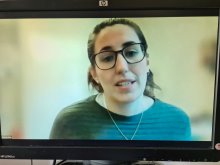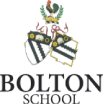
Year 10 girls at Bolton School met former pupil Hannah Earp, virtually, during their morning Form period in the latest talk in the Women of Work series.
Hannah introduced herself as someone working in Marine Sciences. She explained that whilst the field covers organisms that live in the sea, beyond that, careers can also be spent looking at ocean chemistry and the physics of waves and tides, and that work is across all kinds of environments from the deep sea to the Arctic/Antarctic to tropical reefs and mangroves.
Reflecting on her schooldays, from 2000-10, Hannah told how she had kept her options open, choosing GCSEs in Art, Science, two languages, History and Geography as well as English and Maths and, in Sixth Form, A levels in Biology, French and Geography. On leaving Bolton School she opted to study a degree in Marine Biology and Oceanography at Bangor University in Wales, which included a year studying in Australia at La Trobe University. She also stopped off in Borneo for two months on the way back where she completed her Divemasters qualification. From there she developed an interest in diving, particularly in and around coral reefs which led to her working for a charity called The Reef World Foundation in the Philippines which coordinate a UNEP initiative called ‘Green Fins’ that aims to promote sustainability in the diving industry. Admitting to then realising she didn’t know as much as she thought, she went on to study for a two years’ Masters in Tropical Marine Sciences at Universität Bremen in Germany. The course allowed her to spend time studying coral reefs out in French Polynesia and to enjoy an internship in New Zealand.
Following her Masters, she felt it was time for a ‘proper job’ and Hannah told how she engaged members of the public in marine sciences through the Capturing our Coast project at Bangor University before moving to Aberystwyth University for a job investigating differences in marine life on artificial marine structures such as sea walls and natural shores.
In 2019, Hannah started a PhD at Aberystwyth University whilst also working at Aberystwyth and Newcastle Universities. Her research focusses on kelp forests in South America and around the UK. Kelp forests cover almost one third of the world’s temperate coastlines and are home to a vast array of marine life, but they are threatened by climate change and by human activities including harvesting. Hannah told how her work investigates marine life within kelp forests, alongside the threats facing kelp forests, as well as kelp restoration.
Considering what a career in research entails, Hannah said one of the great things is the fun you can have and recalled the great opportunities to swim with sharks, dolphins and whales. Whilst she gave up both Maths and English after GCSE, Hannah did say that both are still important in her work and that a large component of her job involves coding and analysing data, and, she said, she definitely needs English skills in order to author scientific papers. Hannah told how her work also involves sharing findings at conferences, applying for funding, and participating in training courses. Another feature of her job is long and often unsocial hours, particularly as much of her work is tied to the tides, meaning there can often be early mornings/ late nights preparing gear, entering data, and planning the following day’s work. Hannah revealed it is not the most financially fruitful job out there, but that it is truly rich in experiences and can involve lots of travel. She finished her presentation by advising girls how to get into the sector with tips such as learning about nature and taking every opportunity to swim, dive, sail, to volunteer at nature reserves and to get involved with citizen science projects.
Hannah then took time to answer questions about how competitive the job market is and whether you need to have a Masters or a PhD, how the pandemic affected her employment and whether languages are important in her work.





















.jpg&command_2=resize&height_2=85)

